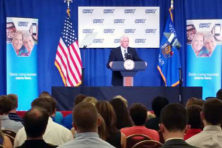State News: State Budget, Health Care, White Supremacy
- Share
- Tweet
- Pin
- Share
Walker: Budget Deal Reached ‘In Principle’
Gov. Scott Walker said state lawmakers are nearing agreement on the delayed 2017-2019 state budget.
Speaking with reporters in Madison, Walker said legislative leaders have reached consensus “in principle” on issues including transportation funding.
“There’s a few little details (remaining), but nothing that will stop or impede the process,” Walker said.
The state budget is almost two months past its June 30 deadline.
Rep. John Nygren, R-Marinette, who co-chairs the budget committee, agreed with Walker that a “framework” exists for the completed budget. However, he emphasized some details still need to be ironed out.
“General conversations have got us to a place where we’re pretty close, but to say we have a deal right now I think would be premature,” Nygren said.
Report Ranks Wisconsin No. 1 In Health Care Quality
A federal agency tracking the quality of health care in doctor’s offices, hospitals and nursing homes says Wisconsin is doing better than all 50 states, followed closely by Massachusetts and Pennsylvania.
Wisconsin moved up two notches from third place last year to first place, according to the federal Agency for Healthcare Research and Quality of the U.S. Department of Health and Human Services.
“The AHRQ rankings are a national validation of what we know here: Wisconsin’s local and regional health systems are delivering some of the best care in the country,” said Wisconsin Hospital Association President and CEO Eric Borgerding. “Across all care settings, in rural and urban communities, we are maintaining consistently high performance, while striving to set even higher standards of care. It is that combination of performance and commitment to be better that makes Wisconsin a perennial leader.”
The report found Wisconsin needs improvement in a couple areas, including how many children go to the hospital for asthma and nursing home patients injured because of falls.
Home Prices Keep Rising, But Not Sales
The latest Wisconsin housing figures show the low number of existing homes for sale continues to hamper the market.
The Wisconsin Realtors Association released its latest monthly housing report Aug. 21. It shows the number of existing homes for sale in the state last month was 13.9 percent lower than in July 2016. As a result, July home sales were down 5 percent year to year.
Home sales in 2016 were the highest in more than a decade, while demand for homes has remained high since last year.
The lower number of available homes has curbed sales and made the buying process more complicated for some would-be homeowners, said economist David Clark of Marquette University.
Assembly Denounces White Supremacy
State lawmakers passed a resolution last week condemning the violence in Charlottesville between white supremacist groups and counter-protesters. The resolution specifically condemned white supremacists, the Ku Klux Klan, neo-Nazis, and “all those who rely on violence and hatred to advance their cause.”
“There is no place for bigotry and prejudice in the great state of Wisconsin, nor in our beloved United States, and it is our responsibility as public servants and elected leaders to denounce all acts of violence and hatred,” said Rep. JoCasta Zamarripa, D-Milwaukee.
The resolution passed unanimously.
Minnesota Shelves Tax Reciprocity Talks
Minnesota is shelving talks with Wisconsin to restore tax reciprocity between the two states. However, Wisconsin’s top revenue official says Minnesota rejected an offer they sent in June.
Around 20,000 Minnesotans work in Wisconsin, while roughly 50,000 Wisconsin residents work across the border.
Wisconsin Department of Revenue Secretary Rick Chandler expressed disappointment in Minnesota’s decision to abandon an income tax agreement with Wisconsin.
“We sent Minnesota an offer in June that met all the conditions in the Minnesota statutes,” wrote Chandler. “A new agreement would have made tax filing more convenient for tens of thousands of Minnesota and Wisconsin residents by allowing them to file one state tax return rather than two.”
In a letter dated June 28, Wisconsin offered to make quarterly payments of $25.25 million for the upcoming 2018 tax year to offset an estimated $150 million in revenues that would be foregone by Minnesota under the agreement. The draft agreement also proposed annual reconciliation payments that would be made with interest beginning on Nov. 15, 2019.
However, Cynthia Bauerly, commissioner for the Minnesota Department of Revenue, wrote in a letter to Chandler last week that Minnesota statutes authorize entering into a reciprocity agreement when it is “in the best interest of the people of this state.” She said some Minnesotans who were paying higher taxes in the absence of an agreement will no longer do so after Minnesota lawmakers included a refundable credit in the state’s 2017 tax bill.
“Given the existence of the new refundable credit that will reduce any negative tax consequence for Minnesotans, and the additional financial exposure for Minnesota’s budget created by the payments required under an agreement, an income tax reciprocity agreement is not in the best interest of the people of Minnesota,” wrote Bauerly.
The two states have been working on an agreement after a previous deal that had been in place for decades ended in 2009. Former Minnesota Gov. Tim Pawlenty pulled out of the agreement after Wisconsin was late making payments.
Wisconsin Public Radio, © Copyright 2017, Board of Regents of the University of Wisconsin System and Wisconsin Educational Communications Board.

